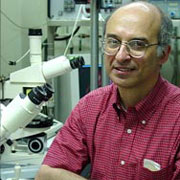Mechanics of cells
 The mechanical activities of non-muscle cells drive many processes in embryonic development, tissue maintenance and healing, immune cell migration and function, neuronal circuit formation, and progression of certain diseases. Our understanding of these processes at the multicellular level requires a foundation of knowledge on the behavior of single cells. This research group studies the mechanics of single fibroblasts through experimental comparison of the arrangement of key cytoskeletal and adhesive proteins to the traction patterns generated by the cell. Our fundamental aim is to answer the following questions: What cytoskeletal machinery is assembled by a fibroblast to carry out a native task? Where is that machinery located within the cell, when does it operate, what is its effect under native conditions, and how is it regulated? A key part of our investigation is the growth of cells in a 3D collagen gel which serves as a model tissue-like extracellular matrix (ECM);. In our experiments, the gel also serves as an elastic in-situ "strain gauge", the deformations of which can be read out by timelapse optical-sectioning microscopy. Using methods adapted from materials science, strain and other measures of mechanical action can be derived through digital image processing and matched to fluorescence images showing specific cytoskeletal proteins such as actin, alpha-actinin, or zyxin. We developed and maintain a web site through which researchers anywhere may analyze timelapse image sequences showing ECM deformation caused by a cell (http://dqa.web.cmu.edu);. In a parallel approach, we are experimenting with molecular methods to analyze activation in cytoskeletal signal-transduction pathways with speed and moderate spatial resolution in single cells. Our secondary aim is to understand the short-term and long-term "rules of engagement" between a fibroblast and its matrix, including neighboring cells. Rules of engagement undoubtedly differ between cell types, and reflect the epigenetic programming that accompanies differentiation. We plan to use this knowledge as a model for understanding and predicting cell responsivity and mechanics in native tissue, and as a design tool in the engineering of tissues.
The mechanical activities of non-muscle cells drive many processes in embryonic development, tissue maintenance and healing, immune cell migration and function, neuronal circuit formation, and progression of certain diseases. Our understanding of these processes at the multicellular level requires a foundation of knowledge on the behavior of single cells. This research group studies the mechanics of single fibroblasts through experimental comparison of the arrangement of key cytoskeletal and adhesive proteins to the traction patterns generated by the cell. Our fundamental aim is to answer the following questions: What cytoskeletal machinery is assembled by a fibroblast to carry out a native task? Where is that machinery located within the cell, when does it operate, what is its effect under native conditions, and how is it regulated? A key part of our investigation is the growth of cells in a 3D collagen gel which serves as a model tissue-like extracellular matrix (ECM);. In our experiments, the gel also serves as an elastic in-situ "strain gauge", the deformations of which can be read out by timelapse optical-sectioning microscopy. Using methods adapted from materials science, strain and other measures of mechanical action can be derived through digital image processing and matched to fluorescence images showing specific cytoskeletal proteins such as actin, alpha-actinin, or zyxin. We developed and maintain a web site through which researchers anywhere may analyze timelapse image sequences showing ECM deformation caused by a cell (http://dqa.web.cmu.edu);. In a parallel approach, we are experimenting with molecular methods to analyze activation in cytoskeletal signal-transduction pathways with speed and moderate spatial resolution in single cells. Our secondary aim is to understand the short-term and long-term "rules of engagement" between a fibroblast and its matrix, including neighboring cells. Rules of engagement undoubtedly differ between cell types, and reflect the epigenetic programming that accompanies differentiation. We plan to use this knowledge as a model for understanding and predicting cell responsivity and mechanics in native tissue, and as a design tool in the engineering of tissues.
Education
PhD, Harvard University
Postdoctoral Training
Syracuse University
Carnegie Mellon University
Department of Biological Sciences
294C Mellon Institute
4400 Fifth Avenue
Pittsburgh, PA 15213
Phone: (412) 268-3460
Fax: (412) 268-7129
E-mail: lanni@andrew.cmu.edu
Visit website

